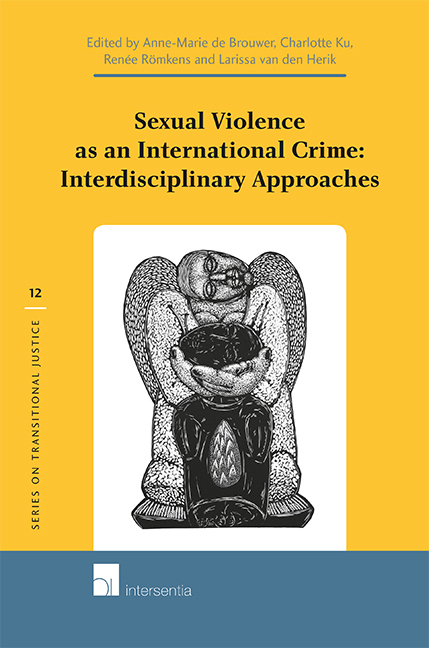Book contents
- Frontmatter
- Acknowledgements
- Foreword
- Contents
- Abbreviations
- INTRODUCTION
- PART 1 OVERVIEW OF SEVERAL MILESTONES AND CHALLENGES CONCERNING INTERNATIONAL CRIMINAL PROSECUTION OF SEXUAL VIOLENCE
- A HISTORICAL PERSPECTIVE, THE WAY FORWARD AND MILESTONES LONG OVERLOOKED
- THE INTERNATIONAL TRIBUNALS AND COURTS
- PART 2 SOCIAL, ARCHIVAL AND MEDICAL DATA COLLECTION AND ITS USE FOR THE CRIMINAL LAW PROCESS: METHODOLOGY ISSUES
- PART 3 SURVIVING SEXUAL VIOLENCE, STORY TELLING AND CREATING AWARENESS
- CONCLUDING REMARKS
- About the Contributors
Chapter 15 - “How Can You Meet Your Rapist and Shake His Hand?”: The Role of Documentarians in Creating Awareness about Sexual Violence – An Interview with Filmmakers Ilse and Femke van Velzen
Published online by Cambridge University Press: 16 December 2020
- Frontmatter
- Acknowledgements
- Foreword
- Contents
- Abbreviations
- INTRODUCTION
- PART 1 OVERVIEW OF SEVERAL MILESTONES AND CHALLENGES CONCERNING INTERNATIONAL CRIMINAL PROSECUTION OF SEXUAL VIOLENCE
- A HISTORICAL PERSPECTIVE, THE WAY FORWARD AND MILESTONES LONG OVERLOOKED
- THE INTERNATIONAL TRIBUNALS AND COURTS
- PART 2 SOCIAL, ARCHIVAL AND MEDICAL DATA COLLECTION AND ITS USE FOR THE CRIMINAL LAW PROCESS: METHODOLOGY ISSUES
- PART 3 SURVIVING SEXUAL VIOLENCE, STORY TELLING AND CREATING AWARENESS
- CONCLUDING REMARKS
- About the Contributors
Summary
Near the end of the documentary ‘Weapon of War’ (IF Productions, 2009), a young woman agrees to meet with the man who gagged, raped and beat her.
They meekly shake hands and sit down at a table together. She looks right at him and says calmly: “I’m not sure you understand that you are now responsible for my life.”
Her fiancé left her after she was raped and now she has to live with her parents, she says. “I’ve lost all of my chances.”
“Please forgive me,” responds the lanky man, a former member of the Mai Mai militia group in the Democratic Republic of Congo (DRC).
He looks down, avoiding the young woman's persistent gaze. “I know now what I did,” he says softly. “We have to forget and forgive each other.”
After speaking for a few minutes, she says: “I can forgive you now.”
Then, in an apparent effort to further atone, he gives her a small piglet, which she accepts.
“I’m very pleased he realizes we’re human beings, too,” she says shortly afterwards.
The extraordinary scene – like much of the documentary – upends commonly held notions of what it means to be a perpetrator and a rape victim. It also complicates the idea of what exactly constitutes justice in a country where sexual violence has reached epidemic proportions and impunity continues to reign. Since war began to rage in 1996, it is estimated that hundreds of thousands of Congolese women have been raped and often viciously brutalized. While numerous articles, reports and films have explored the issue of sexual violence in the DRC, ‘Weapon of War’ is unusual because it is told mainly from the point of view of the perpetrators. Most of the rapists are portrayed not as faceless monsters, but as men haunted and often severely traumatized by what they have done.
Dutch filmmakers and twin sisters Ilse and Femke Van Velzen have for several years concentrated their work on Africa, previously making films about Angola and South Africa. Their first film about the DRC, Fighting the Silence, focused on rape victims who were abandoned by their husbands.
- Type
- Chapter
- Information
- Publisher: IntersentiaPrint publication year: 2013



